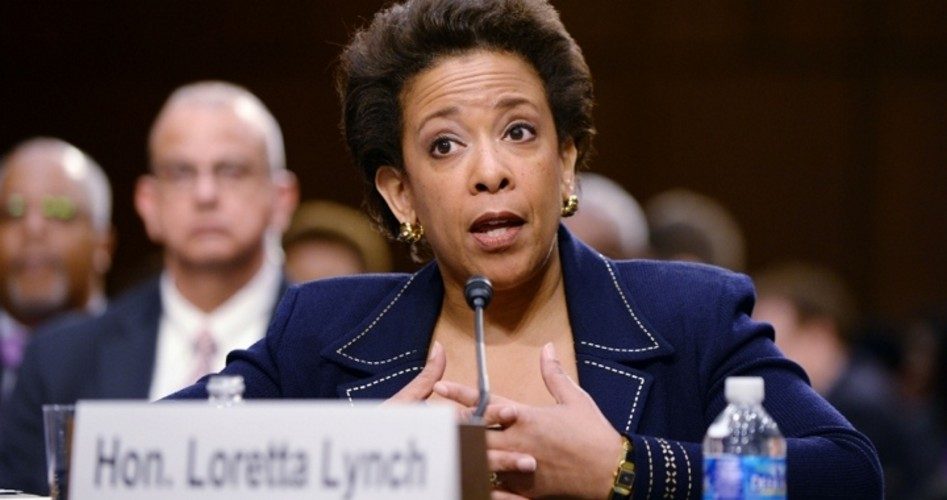
Friday’s news that French state financial prosecutors were joining with the Swiss government in pursuing charges that HSBC’s Swiss banking division was engaging in illegal tax dodges for their wealthy clients may have spelled the end of the nomination of Loretta Lynch (shown) to replace Eric Holder as U.S. Attorney General.
Three years ago, Lynch caved in and let HSBC off the hook with a modest fine and a slap on the wrist following its investigation into the bank’s money-laundering activities that helped fund Middle East terrorists and Mexican drug cartels. Lynch’s agreement insulated guilty parties from criminal prosecution while allowing the bank’s money laundering activities to continue despite its agreeing to a “cease and desist” order.
The current head count in the Senate gives 50 votes for confirmation, including four Republican senators: Orrin Hatch (R-Utah), Jeff Flake (R-Ariz.), Lindsey Graham (R-S.C.) and Susan Collins (R-Maine). Just two need to change their vote and the Lynch nomination is history.
We can credit Senator David Vitter (R-La.) for reopening the wound that Lynch no doubt hoped would disappear with the passage of time. Following a meeting late last year with John Cruz, a former HSBC employee and present whistleblower, Vitter’s staff asked, “How can we allow Loretta Lynch to be the nation’s top law enforcement officer when the HSBC money-laundering scandal raises questions about the propriety of the agreement she engineered?”
For years Cruz has been trying to interest various agencies in the information he gleaned while working for HSBC, gaining nothing but the classic runaround. It wasn’t until World News Daily investigated Cruz’s charges that the truth about HSBC’s activities came to light. Now Lynch is faced with the question she had likely been hoping would never be asked: “Why did you cut such a sweet deal for HSBC in light of the decades-long history of their money-laundering activities amounting to millions of dollars of assistance to America’s enemies?”
Earlier, questions about immigration, Lois Lerner’s missing e-mails, Obama’s executive orders, Fast and Furious, and amnesty were brushed off by Lynch on her way to confirmation. Some questions weren’t even asked, such as the sweet deal she cut with investment banker Felix Sater in exchange for his “cooperation.”
Some were handled by carefully rehearsed waffling. When asked who she believed had a greater right to work, illegal immigrants or lawful immigrants and American citizens, Lynch responded, “Senator, I believe the right and the obligation to work is one that’s shared by everyone in this country, regardless of how they came here.”
That answer was clarity itself compared to this response when Senator Jeff Sessions (R-Ala.) asked her:
Would you [as Attorney General] take action against an employer who says, “No, I prefer to hire someone who came to the country lawfully rather than someone given executive amnesty by the president?”
Lynch: With respect to the — the provision about temporary deferral, I did not read it as providing a legal amnesty, that is, that permanent status here, but a temporary deferral.
With respect to whether or not those individuals would be able to seek redress for employment discrimination, if — if that is the purpose of your question — again, I haven’t studied that legal issue.
Some issues from her past were ignored altogether, including her decision not to criticize or punish District Attorney Mike Nifong in the Duke University black stripper/rape case against some white students. When it was learned that the stripper’s testimony was false but was aided by “serious procedural violations” by Nifong, Lynch refused to condemn him, stating instead that there was latent racism in the community despite the false evidence produced in the case.
Her position that the death penalty is per se racist since it is so often applied to blacks and Hispanics also failed to gain any traction or publicity during her quizzing.
Voter ID laws fall into the same category, according to Lynch. Attempts to restore sanity into those laws by the state of North Carolina were not only challenged by Holder’s Department of Justice, but supported by Lynch who criticized those favoring the new ID laws as “people trying to take over the [North Carolina] state house and reverse the gains that have been made in this country.”
Most telling in the mounting resistance to Lynch’s nomination was Matt Taibbi’s diatribe against banks in general, and HSBC in particular, in Rolling Stone magazine just weeks after her nomination hearings began. Wrote Taibbi:
The U.S. Justice Department granted a total walk to executives of … HSBC for the largest drug-and-terrorism money-laundering case ever. Yes, they issued a fine — $1.9 billion, or about five weeks’ profit — but they didn’t extract so much as one dollar or one day in jail from any individual, despite a decade of stupefying abuses.
Jack Blum, a Washington lawyer who served for fourteen years with the Senate Antitrust Subcommittee, was even more scathing in his reaction to Lynch’s agreement with the bank, saying that HSBC “violated every … law in the book. They took every imaginable form of illegal and illicit business.”
Lynch was part of the understanding that the DOJ wasn’t to be too hard on the bank because it was too big to fail. The HSBC is huge, with 266,000 employees worldwide, 6,660 offices in 80 countries around the globe, and 60 million customers. When the Lynch agreement was announced late last year, Assistant Attorney General Lanny Breuer explained why it was just a wrist-slap: “Had the U.S. authorities decided to press criminal charges, HSBC would almost certainly have lost its banking license in the U.S., the future of the institution would have been under threat, and the entire banking system would have been destabilized.”
It’ll be interesting to see how Lynch wriggles and waffles her way out of this one. What will be more interesting to see will be if those four Republican Senators now favoring her nomination grow a backbone and turn her nomination into a short footnote in history.
Photo of Loretta Lynch: AP Images
A graduate of an Ivy League school and a former investment advisor, Bob is a regular contributor to The New American magazine and blogs frequently at www.LightFromTheRight.com, primarily on economics and politics.




